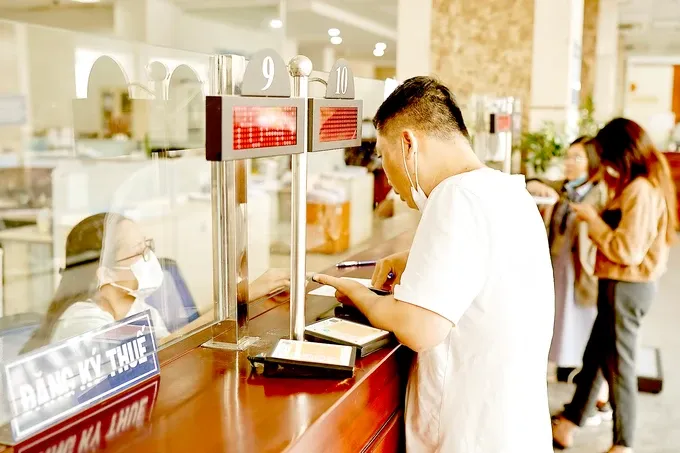
Even at the downturn of the national economy, e-commerce activities in Vietnam are still bustling. Statistics reveal that in November 2023, the total transaction value of 2.6 million shops in the four major trading platforms, namely Shopee, Lazada, TikTok Shop, and Tiki, reached nearly VND32trillion (US$1.32 billion).
Opposite to the sluggishness of shops along streets, online stores are extremely busy processing orders. A decoration shop owner, for instance, can sell thousands of decorating pine trees made from velvet zinc this Christmas time, earning hundreds of millions of VND in a month.
As regulated, with a revenue of over VND100 million (US$4,115) a month, an online shop owner has to pay personal income tax and value added tax at the rate of 1.5 percent of that income. Data from the General Department of Taxation, in 2021 and 2022, the tax amounts from individuals and organizations doing e-commerce business were VND261 billion ($10.74 million) and VND716 billion ($29.47 million) respectively. The sum for 2023 is estimated to have an increase.
In HCMC, in 2023, the tax agency checked about 5,900 e-commerce taxpayers and adjusted the tax amount for a rise. It issued fines worth VND217 billion ($8.93 million), an increase of 29 percent compared to 2022. Among the punished cases, more than 5,600 are business households doing e-commerce trading to collect a total fine of VND150 billion ($6.17 million). The rest came from seven enterprises in this field.
The HCMC Tax Department shared that the data from the e-commerce portal of the General Department of Taxation is one key source for this unit to effectively inspect taxpayers and issue fines to violators. The number of taxpayers in 2023 increased by 35 times and the fine amount by VND140 billion ($5.76 million) compared to the previous year.
On December 15, 2022, the General Department of Taxation launched its e-commerce portal to receive information. Until now, the portal has stored data of more than 191,000 organizations and individuals on 357 e-commerce trading floors, with the total transaction value of about VND59 trillion ($2.43 billion).
Despite such a promising trading potential, it is not at all easy to manage tax collection from e-commerce activities, as stated by Head Nguyen Thi Lan Anh of the Small and Medium-sized Enterprises, Household and Individual Tax Management Department (under the Taxation General Department). Households and individuals doing e-commerce activities do not often register for a business permit, tax paying, or have a formal business address. Some even use the information of other people to register for business.
What is more, a shop owner may open many online stores on different trading floors and social network sites, which is awfully challenging to collect data for tax calculation. Also, the information provided by trading floors is sometime imprecise as well. Adding to that is the impossibility of tax departments to access all data stored on the e-commerce portal of the General Department of Taxation due to permission restrictions.
Another problem comes from Cash-on-delivery (COD) transactions, where delivery partners cannot provide suitable information to identify the name or tax code of sellers for tax management.
The last trouble lies in the cases of organizations and individuals staying in Vietnam but having earnings from cross-border services on digital platforms (producing digital content and digital applications via Google, Facebook, Netflix). Tax agencies had already sent requests for identification to 56 banks, yet only 15 responded.
Aware of the above issues, the HCMC Tax Department has proposed the establishment of inter-ministerial cooperation regulations in providing e-commerce information, in tax management, and in inspecting trading floor owners and businesses that operate as transportation intermediaries and payment intermediaries.
According to Decree No.91/2022, trading floors must provide tax agencies with information of online shop owners for the task of tax collection and management. These owners must perform their tax payment duty under the instruction of local tax units. Some trading floors in Vietnam shared that they are willing to help shop owners and tax agencies when requested to ensure the most convenience in the tax payment procedure.
























